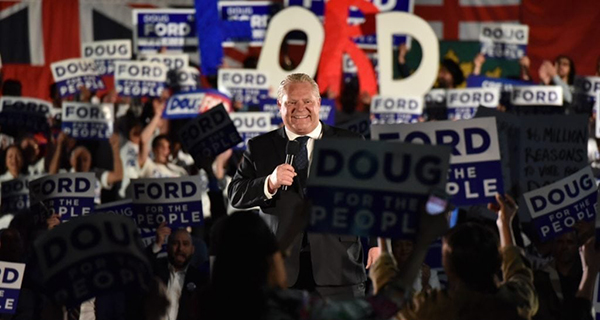 What was Canada’s biggest political story of 2018? In my opinion, when all four levels of government were briefly involved in one small area of public policy debate.
What was Canada’s biggest political story of 2018? In my opinion, when all four levels of government were briefly involved in one small area of public policy debate.
It started when Ontario Premier Doug Ford’s Progressive Conservative government announced on July 27 that it would decrease the number of city council seats in Toronto from 47 to 25. This would match the number of federal and provincial seats in the city, and save Toronto taxpayers roughly $25 million over four years.
Ford’s government has the democratic right to change the parameters of a municipal election through the City of Toronto Act. It seemed like a wise proposal to save taxpayer dollars and remove politicians attached to the public teat – which would cause few people to shed any tears!
Many left-leaning city councillors and would-be candidates opposed this move. With a municipal election scheduled for Oct. 22 and some people having campaigned since May, the premier’s timing (made on the official cutoff date for candidate registration) was seen as questionable.
Ford was a city councillor (2010-2014) when his late brother, Rob, was Toronto’s controversial crack-smoking mayor. And the premier was a failed 2014 mayoral candidate. Some councillors felt his seat-slashing was nothing more than a vindictive act of settling some old political scores.
Ignoring the outcry and tall tales, Ford’s government passed Bill 5, or the Better Local Government Act. Toronto Mayor John Tory and city council took the Ontario PCs to court – and, much to the provincial government’s chagrin, the Sept. 17 decision went against them.
Justice Edward Belobaba’s ruling was rather controversial, however.
Belobaba bizarrely incorporated principles from the federal Charter of Rights and Freedoms to justify his position that Bill 5 “substantially interfered with both the candidate’s and the voter’s right to freedom of expression” in a city election. As well, his reaction to the Ontario government’s belief the “primary concern” of Bill 5 wasn’t “voter parity but effective representation,” and wondering “why do so in the middle of the city’s election?” elicited a strange, one-word response: “Crickets.”
Many political commentators, left and right, felt the judge had overstepped his boundaries. Not by baby steps, but craters the size of the Grand Canyon.
Ford wasn’t going to be stopped. He immediately recalled the Ontario legislature, reintroduced the bill and took a dramatic step few observers had predicted: he would invoke Section 33 of the federal Charter, or the notwithstanding clause, to get it passed.
This barely-used clause has been called the nuclear option of Canadian politics. Quebec’s former separatist government invoked it twice for explosive battles related to language laws, while Saskatchewan and the Yukon used it for smaller issues. Ford’s impending use of Section 33 would, therefore, have been a huge and controversial political moment in English-speaking Canada. (The provincial government won its judicial appeal, so this step never occurred.)
Liberal Prime Minister Justin Trudeau could have inserted himself in this debate by implementing federal disallowance to trump the notwithstanding clause, but he opted against using this policy (which has been dormant since 1943).
And Ford subtly suggested he’d be willing to invoke the notwithstanding clause in other situations, which would surely divide Ontario – and his government’s support base.
There you have it. A provincial government attempted to change the parameters of a city election, which went to the judiciary and was ruled against by using a federal piece of legislation, which was then turned down with another piece of federal legislation.
It was a humorous, bizarre, dramatic and history-making event, and my pick for the biggest political story in the Great White North.
Will it be topped (or, ahem, trumped) in 2019?
We’ll find out in due course.
Happy New Year, one and all!
Troy Media columnist and political commentator Michael Taube was a speechwriter for former prime minister Stephen Harper.
The views, opinions and positions expressed by columnists and contributors are the author’s alone. They do not inherently or expressly reflect the views, opinions and/or positions of our publication.


